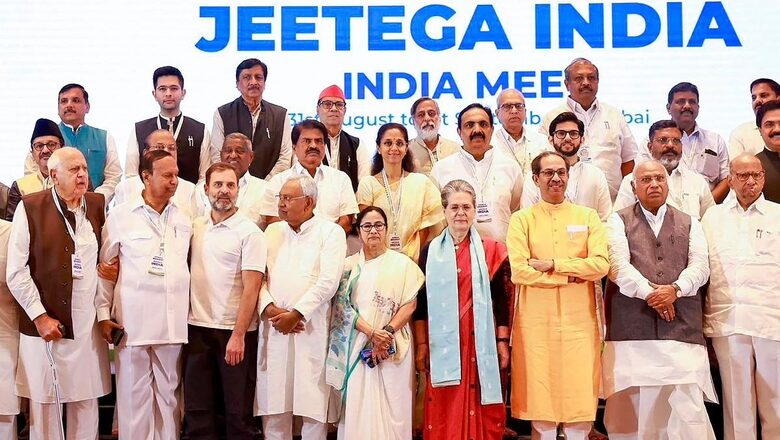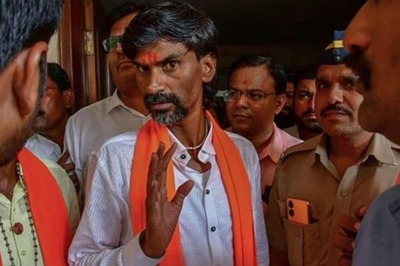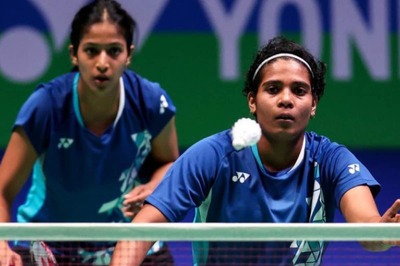
views
In India, that is Bharat, the life of an individual significantly rolls around a belief system, thereby it is a land of faith. The political parties, elections, and rulers continue to be provisional, but history teaches us that culture and dharmic values shall remain as paradigms set for humanity.
The INDIA alliance partners came together with one main objective — to defeat the Modi government. The alliance partners are in opposition with each other at the state level, but all ideologies are compromised for a temporary electoral arrangement to deal with the 2024 elections. INDIA alliance, whether with “dots” or without “dots”, the people “doubt” the intent when the leaders’ voices are sceptical.
The epics Ramayana, Mahabharata and Upanishads were written by Rishis. The great Rishis were not from a so-called upper class but they were acknowledged based on a hierarchy of knowledge and not on caste. One of the INDIA alliance partners wished to eradicate the Sanatan Dharma and the same has been further supported by various alliance leaders. Sanatan Dharma has survived even after thousands of years of invasion and the current effort to eradicate it is impossible in this land of faith.
Sanatan Dharma has eternal significance as a way of harmonious life in union with the universe. Hinduism is not a religion; it is a way of life based on Sanatan Dharma. The ideology of Congress emancipated with national unity, but the selective silence of central leadership on the ‘Sanatan Dharma eradication’ is giving a message of ideological challenges and deviations from basic principles. The caste system was encapsulated into people’s minds as an invasion theory, instigated to divide and rule with vested interests. Relating Sanatan Dharma to cast oppression is completely abysmal propaganda politics.
Indeed, the controversy has led to the resurrection and unification of a silent community that always prayed for universal good. The caste and religious division has been considered an opportunity for vote bank politics for decades. The continued colonial influence effortlessly implanted nepotism and dynastic politics in the country. Secularism has become a word of convenience for politicians to use randomly, but there has been no collective and earnest effort to reduce religious polarisation or discourage religious hype.
Indian National Congress has lost two parliament elections — 2014 and 2019. The Congress party did not do enough to analyse the real reason for the historical defeat. They created a temporary political alliance, and eventually, they had to compromise for 54 seats in the parliament. The 2019 election result was a guide for many political establishments in India and some lost their national party status. Narendra Modi took power through the democratic process. The Opposition parties made a tectonic shift in their approach and came up with the slogan “democracy is in danger” which, in reality, was a challenge to the people’s mandate.
Unlike China, ours is a democratic country, and the Opposition has all the freedom to speak about the nation within or outside. Rahul Gandhi’s statement on China may be an innocent one, but it created doubt for the people as part of propaganda tactics. China’s vision of the Belt and Road Initiative is purely on business and strategic interests. An alternative to China’s BRI and to transform India into a global production hub was feasible but why did the previous Congress government abstain from taking such challenges or not setting a vision?
The Chinese Communist Party succeeded in the optimum usage of communist ideologies and extracting capitalistic ideas to channel the resources to maximum potential with a due understanding of demographic strength, which is surely a major reason for the transformation of the Chinese economy.
India’s opportunity of getting a permanent seat in the United Nations Security Council (UNSC) was a slip between the cup and the lip because our leaders believed it was unfair to accept such invitations from the US and failed to visualise the impact. India’s first Prime Minister, Jawaharlal Nehru made it clear that though India deserved a permanent seat in the UNSC, it won’t grab it at the expense of China, which was also a candidate for the same seat. Today, the same China is blocking us from being a permanent member, so a historical mistake from our end hounds us in the background.
The past strategies of fenceless boundaries/imaginary boundaries and their consequences have surely made us rethink our future plans. We cannot redo the same, but a collective effort is required to overcome past mistakes and vouch for our strength, rather than praising a neighbour with expansionist strategies.
Modi government worked reasonably well with the motto of ‘Sabka Saath, Sabka Vikas, Sabka Vishwas’. It continued to eliminate the colonial inscriptions whether it is the Penal Code, history, inequality or exceptional rights. Home Minister Amit Shah’s statements echoed in the Parliament consistently to erase such colonial inscriptions and bring pride to the people of this country.
The success of the G20 and its declarations are worth appreciating, beyond politics. Unfortunately, in India, the Opposition stands for opposing everything and anything but still, some appreciation is observed from elite intellectuals of the party. If we don’t do enough, we will continue to be in trouble facilitating the aspirations of 1.4 billion people. The Opposition must stand as a corrective force that can influence the people or bring more innovative ideas to take the country to a new level. Our youth is looking for constructive ideological feedback with meaningful solutions rather than random statements.
Freebie declarations, appeasement politics and hatred of individuals of any party must be discouraged. It doesn’t mean the deserving one should be eliminated from any free facilities; it is their constitutional right but they are not in anyone’s mercy.
The ideological challenges of the INDIA alliance are much wider. Alliance partners continue to make comments based on regional interests and the ideologies are no longer confined to regions alone. ‘One Nation One Election’ and the name ‘Bharat’ is also floating around promptly. Undoubtedly, ideological differences are inherent in the alliance and the impact will largely be on the Indian National Congress in the long run.
Raveendranath is the author of the book, ‘Sunshine Over Backwaters’. His Twitter @CRaviram2022. Views expressed in the above piece are personal and solely that of the author. They do not necessarily reflect News18’s views.




















Comments
0 comment